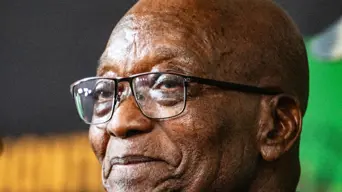Could he? CAN he? Does the law support Jacob Zuma's presidential aspirations?
Two of the country's best legal minds debate the meaning of section 88(2) of the Constitution as it relates to Jacob Zuma's presidential ambitions.

Former President Jacob Zuma addresses members of the media under the banner of new party uMkhontho weSizwe on 16 December 2023. Picture: Kayleen Morgan/ Eyewitness News
Bongani Bingwa's guests are University of Limpopo law professor Omphemetse Sibanda and Public Law expert Professor Pierre De Vos (University of Cape Town).
Click below to listen to the full interview.
With his uMkhonto we Sizwe Party performing well in the polls, former President Jacob Zuma is a political cat with nine lives.
But, despite the popularity of his party, Zuma's not-so-secret presidential aspirations could well be scuppered before they've even taken off.
Having overcome one legal hurdle - the Electoral Court ruled earlier this month that Zuma could run for office in the upcoming general election despite having been convicted of a crime - he now has another, even bigger one to face.
Section 88(2) of the Constitution states that “no person may hold office as President for more than two terms, but when a person is elected to fill a vacancy in the office of President, the period between that election and the next election of a President is not regarded as a term.”
However, legal experts are divided over whether this means Zuma can or cannot serve again as President of the Republic.
"When I look at the provisions, they are couched in permissive terms. They are talking about may rather than stating shall or must."
- Prof. Omphemetse Sibanda, Faculty of Management and Law - University of Limpopo
"When you are talking about two terms, typically it refers to a limitation on a number of times an individual can hold office consecutively; it does not really talk about cumulative."
- Prof. Omphemetse Sibanda, Faculty of Management and Law - University of Limpopo
"If there is a break, what is preventing a person coming back in terms of this particular provision?"
- Prof. Omphemetse Sibanda, Faculty of Management and Law - University of Limpopo
While Sibanda argues that the provision is ambiguous, De Vos says it is not at all vague.
He says the drafters of the Constitutional provision were quite clear in their omission of the word 'consecutive'.
"If it says two terms, it's two terms, it doesn't mean consecutive terms."
- Prof. Pierre De Vos, Public Law expert - UCT
"Unless one adds a word that isn't there, I think it will be extremley difficult to convince any court, I think impossible, that what it says is two terms, not two consecutive terms."
- Prof. Pierre De Vos, Public Law expert - UCT
Following the ruling of the Electoral Court earlier this month, MK Party's spokesperson Nhlamulo Ndhlela said, "We are ecstatic at the court verdict. What this means is that he will be our presidential candidate and he will be in Parliament after the elections."
ALSO READ: Tracking the rise of Zuma's MK Party
Scroll up to the audio player to listen to the interview.